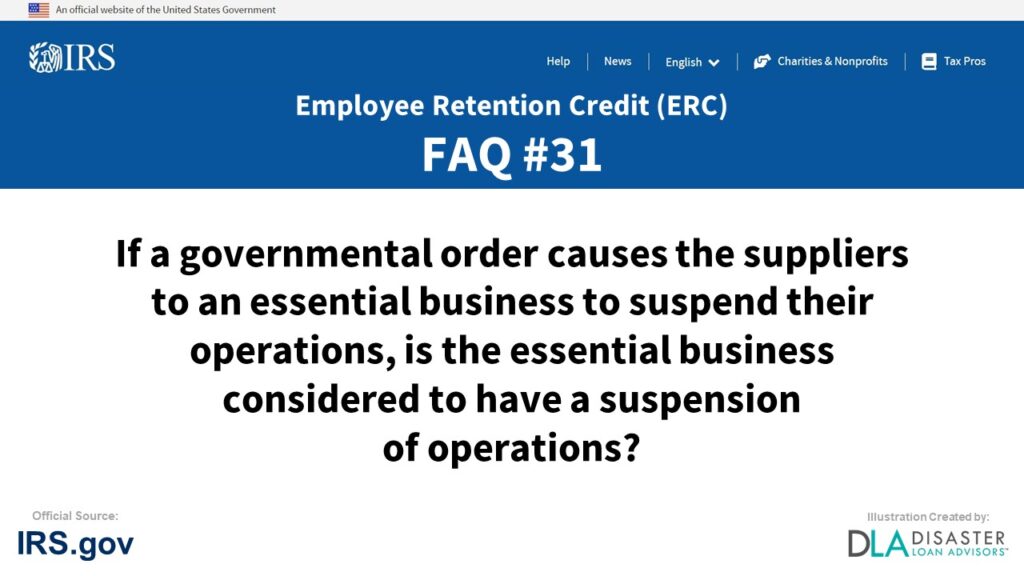
Frequently asked question #31 “If a governmental order causes the suppliers to an essential business to suspend their operations, is the essential business considered to have a suspension of operations?” under the Determining When an Employer’s Trade or Business Operations are Considered to be Fully or Partially Suspended Due to a Governmental Order section of FAQs: Employee Retention Credit under the CARES Act, provided by the IRS.gov to help business owners understand the ERC program. Information is below for the question #31 If a governmental order causes the suppliers to an essential business to suspend their operations, is the essential business considered to have a suspension of operations?
ERC Credit Frequently Asked Question #31:
COVID-19-Related Employee Retention Credits:
Determining When an Employer’s Trade or Business Operations are Considered to be Fully or Partially Suspended Due to a Governmental Order FAQs
31. If a governmental order causes the suppliers to an essential business to suspend their operations, is the essential business considered to have a suspension of operations?
An employer with an essential business may be considered to have a full or partial suspension of operations if the business’s suppliers are unable to make deliveries of critical goods or materials due to a governmental order that causes the supplier to suspend its operations.
If the facts and circumstances indicate that the essential business’s operations are fully or partially suspended as a result of the inability to obtain critical goods or materials from its suppliers that were required to suspend operations, then the essential business would be considered an Eligible Employer and may be eligible to receive the Employee Retention Credit.
Alternatively, the employer may be an Eligible Employer if it experiences a significant decline in gross receipts. For more information on what constitutes a significant decline in gross receipts, see Determining When an Employer is Considered to have a Significant Decline in Gross Receipts.
Example: Employer A operates an auto parts manufacturing business that is considered an essential trade or business in the jurisdiction where it operates. Employer A’s supplier of raw materials is required to shut down its operations due to a governmental order.
Employer A is unable to procure these raw materials from an alternate supplier. As a consequence of the suspension of Employer A’s supplier, Employer A is not able to perform its operations.
Under these facts and circumstances, Employer A would be considered an Eligible Employer because its operations have been suspended as a result of the governmental order that suspended operations of its supplier.
For more Internal Revenue Service (IRS) Department of the Treasury Employee Retention Credit (ERC) Determining When an Employer’s Trade or Business Operations are Considered to be Fully or Partially Suspended Due to a Governmental Order FAQs, visit the official IRS.gov tax website.
Conclusion and Summary on ERC Credit FAQ #31. If a governmental order causes the suppliers to an essential business to suspend their operations, is the essential business considered to have a suspension of operations?
The “If a governmental order causes the suppliers to an essential business to suspend their operations, is the essential business considered to have a suspension of operations?” is Frequently Asked Question #31 of many commonly asked questions small business owners are wondering about how to file the Employee Retention Tax Credit (ERTC). The IRS ERC Tax Credit program is a confusing and complex process to determine the correct ERC calculations your business qualifies for. Answers to “If a governmental order causes the suppliers to an essential business to suspend their operations, is the essential business considered to have a suspension of operations?” and filling out form 941-X may change slightly from frequently updated rules and regulations from the IRS. Leave a comment below if you have further questions on ERC Credit FAQ #31.
Help Completing / Filing / Claiming the Employee Retention Credit (ERC)
Receive Up to a $26,000 ERC Credit from the IRS Per Employee
Disaster Loan Advisors can assist your business with the complex and confusing Employee Retention Credit (ERC), Form 941-X, and the Employee Retention Tax Credit (ERTC) program.
Depending on eligibility, business owners and companies can receive up to $26,000 per employee based on the number of W2 employees you had on the payroll in 2020 and 2021.
The ERC / ERTC Tax Credit Program is a valuable IRS tax credit you can claim. This is money you have already paid to the IRS in payroll taxes for your W2 employees.
We DO NOT charge a percentage (%) of your ERC Refund like some companies are charging. Some ERC firms out there are charging upwards of 15% to 35% of your ERC refund!
Our professional ERC fee and pricing structure is very reasonable in comparison.
If you are looking for an ERC Company that believes in providing professional ERC Services and value, in exchange for a fair, reasonable, and ethical fee for the amount of work required, Disaster Loan Advisors is a good fit for you.
Schedule Your Free Employee Retention Credit Consultation to see what amount of employee retention tax credit your company qualifies for.
Cover Image Credit: Irs.gov / ERC FAQ / Disaster Loan Advisors.
- 941-X: 14. Section 3121(q) Notice and Demand—Tax on Unreported Tips, Form Instructions (revised 2024) - April 26, 2024
- 941-X: 12. Taxable Medicare Wages & Tips, Form Instructions (2024 updates) - April 24, 2024
- 941-X: 11. Taxable Social Security Tips, Form Instructions (revised 2024) - April 23, 2024
